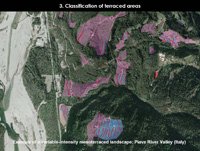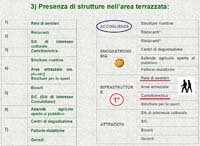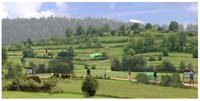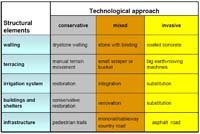Search

Latest methodological proposals
In occasion of the project meeting in Goriska Brda (Slovenia), held on the 12th and 13th of October, 2006, the latest methodological proposals have been presented as regards the main topics faced by ALPTER project: mapping, risk assessment, tourism promotion, recovery.

Mapping terraced areas in the Alps
by Mauro Varotto, University of Padua
The presentation describes the main steps to undertake when mapping terraced sites, together with the main problems so far faced and the solutions applied, with particular regard to GIS elaboration. A proposal for classification of terraced areas is also suggested, based on two standard indexes.

by Gerardo Brancucci and Guido Paliaga, University of Genoa
The working method and the preliminary results from the application of an experimental hazard assessment model on the Liguria case study are presented, based upon a multivariate statistical analysis of landscape features associated with past landsliding.

Tourist promotion in terraced landscapes
by Lisa Garbellini, IREALP (Italian version only)
The presentation describes the main results deriving from the elaboration of the answers to the questionnaire about tourism in the project pilot areas. Actual and potential tourist demand and supply have been analysed, from which the opportunities provided by terraced landscapes emerge.

Choice model on landscape preferences
by Arne Arnberger and Renate Eder from BOKU University of Vienna
The presentation proposes an innovative landscape preferences evaluation system based on the perception of several landscape scenarios by potential visitors of terraced areas. The choice model, which utilises 128 different images, has been developed by the BOKU University of Natural Resources and Applied Sciences and it is being tested in the Austrian pilot area.

From conservation to promotion: overview of recovery strategies
by Luca Lodatti and Laura Fagarazzi, Veneto Region
The presentation proposes a value assessment framework for terraced areas from the point of view of sustainability (taking into account social, economic and environmental aspects), aimed at evaluating the feasibility and priority of recovery interventions.
» From conservation to promotion - PDF, 698.7 kb
» Hazard assessment - PDF, 367.3 kb
» Mapping terraced areas in the Alps - PDF, 3 Mb
» Tourist promotion in terraced landscapes - PDF, 136.1 kb







